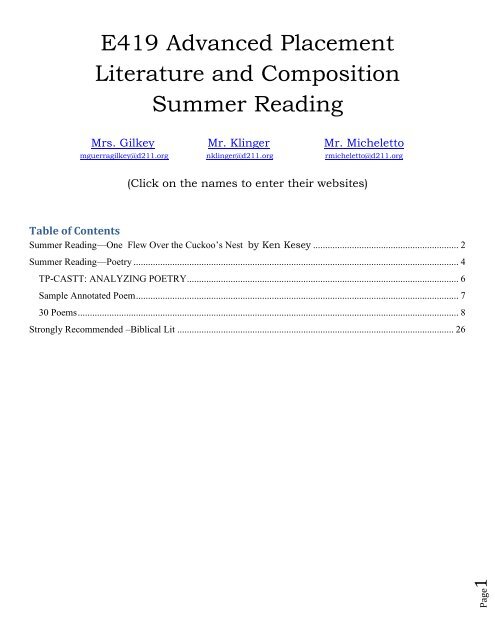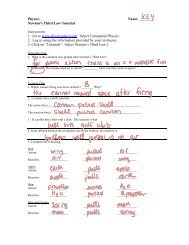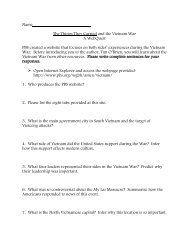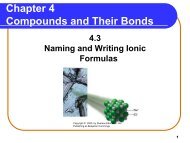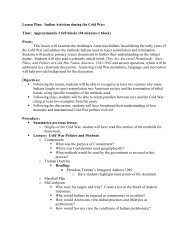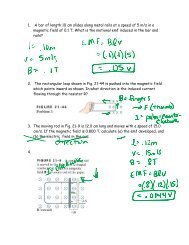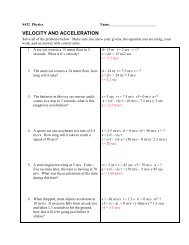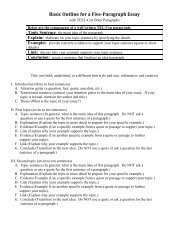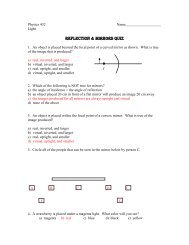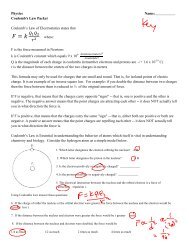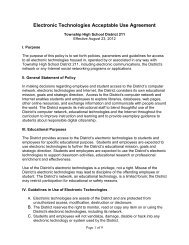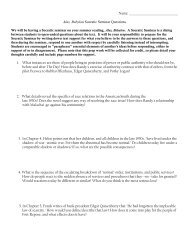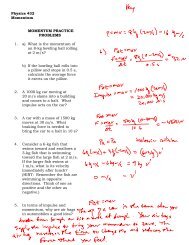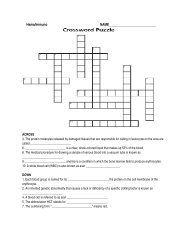Create successful ePaper yourself
Turn your PDF publications into a flip-book with our unique Google optimized e-Paper software.
E419 Advanced Placement<br />
Literature and Composition<br />
<strong>Summer</strong> <strong>Reading</strong><br />
Mrs. Gilkey Mr. Klinger Mr. Micheletto<br />
mguerragilkey@d211.org nklinger@d211.org rmicheletto@d211.org<br />
(Click on the names to enter their websites)<br />
Table of Contents<br />
<strong>Summer</strong> <strong>Reading</strong>—One Flew Over the Cuckoo’s Nest by Ken Kesey ............................................................ 2<br />
<strong>Summer</strong> <strong>Reading</strong>—Poetry ...................................................................................................................................... 4<br />
TP-CASTT: ANALYZING POETRY ................................................................................................................ 6<br />
Sample Annotated Poem ..................................................................................................................................... 7<br />
30 Poems ............................................................................................................................................................. 8<br />
Strongly Recommended –Biblical Lit .................................................................................................................. 26<br />
Page1
<strong>Summer</strong> <strong>Reading</strong>—One Flew Over the Cuckoo’s Nest by Ken Kesey<br />
Over the summer, read and annotate One Flew Over the Cuckoo’s Nest, a novel by Ken<br />
Kesey. Elements from One Flew Over the Cuckoo’s Nest will infuse many of the other works<br />
in the 419 curriculum. Be advised that you should have the novel completed before<br />
returning to school. When reading, think in terms of motifs, allusions, archetypes,<br />
symbols, and social issues, as well as the rhetorical strategies learned in English 319.<br />
In addition, consider the following points as you read and mark the text:<br />
• Trace the psychological progress of the main characters in the story.<br />
• Consider Kesey’s choice of Chief Bromden as narrator instead of McMurphy. What<br />
does the author achieve through this choice?<br />
• Explore the religious and Biblical themes in the novel.<br />
• Think about the role of women in the novel. Delineate their effect on the men in the<br />
story.<br />
• Explore Kesey’s treatment of African Americans within the story. Is his portrayal<br />
racist? (Consider the year of publication.)<br />
• Trace literary elements/devices and their contribution to meaning. See the poetry<br />
assignment for a list of devices to consider<br />
Be prepared to take an objective, multiple choice test during the first week of class.<br />
Page2
Assignment #1: Write an AP-style essay which answers the following prompt.<br />
A symbol is an object, action, or event that represents something or that creates a<br />
range of associations beyond itself. In literary works, a symbol can express an idea,<br />
clarify meaning, or enlarge literal meaning. Focusing on one symbol in One Flew Over<br />
the Cuckoo’s Nest, write an essay analyzing how that symbol functions in the work<br />
and what it reveals about the characters or themes of the work as a whole. Do not<br />
merely summarize the plot<br />
Assignment #2: Choose one of the following two prompts to answer in an AP-style essay.<br />
1. One of the strongest human drives seems to be a desire for power. Write an essay in<br />
which you discuss how a character in a novel or a drama struggles to free himself or<br />
herself from the power of others or seeks to gain power over others. Be sure to<br />
demonstrate in your essay how the author uses this power struggle to enhance the<br />
meaning of the work.<br />
2. One definition of madness is “mental delusion or the eccentric behavior arising from<br />
it.” But Emily Dickinson wrote<br />
Much madness is divinest Sense-<br />
To a discerning Eye-<br />
Novelists and playwrights have often seen madness with a “discerning Eye.” Select a<br />
novel or play in which a character’s apparent madness or irrational behavior plays an<br />
important role. Then write a well-organized essay in which you explain what this<br />
delusion or eccentric behavior consists of and how it might be judged reasonable.<br />
Explain the significance of the “madness” to the work as a whole. Do not merely<br />
summarize the plot.<br />
Both essays will be:<br />
• two double-spaced pages in length<br />
• typed in standard MLA format<br />
• collected on the first day of school<br />
Page3
<strong>Summer</strong> <strong>Reading</strong>—Poetry<br />
Complete steps 1-3 for the 1st day of school.<br />
1. Print out the list of 30 Poems on page 8<br />
• Look at the TP-CASTT: ANALYZING POETRY on page 6 to guide your reading, organization, and analysis.<br />
2. Annotate the 30 poems using the guidelines below.<br />
• What does the poem mean? It is not simply underlining! Generally speaking, annotation involves having<br />
an active dialogue with whatever it is you are reading (aka, active reading). Fill the margins around the<br />
poem with your words that comment on and clarify the text. What does that mean? Not in any<br />
hierarchal order, annotating a poem involves the following:<br />
a. Knowing the vocabulary of the poem...look up words you don't know...how and why might the poet<br />
have used such diction?<br />
b. Catalogue questions... do not be afraid to ask questions of the language ... remember, the poem is<br />
speaking to you<br />
c. Catalogue your insights... what are you thinking as you read? What associations are you making?<br />
Why? What led you there?<br />
d. What poetic devices seem important/popular/significant/speak to you? WHY is the poet using<br />
them? What effect/function do these devices have? In other words, how does the poet construct<br />
meaning through his/her poetic devices?<br />
These are some common devices, but you may choose other devices; you are not limited to only<br />
the ones listed here:<br />
imagery metaphor simile personification symbolism<br />
assonance consonance alliteration onomatopoeia allegory<br />
meter rhythm rhyme scheme patterns punctuation<br />
allusion denotation connotation tone mood<br />
irony paradox juxtaposition apostrophe theme<br />
redundancy repetition<br />
Remember to zero in on the devices that create a specific effect and/or meaning; don’t<br />
just create a list of devices…<br />
e. Please keep in mind that you must read a poem literally (Who is the speaker? What is the situation?<br />
How can I paraphrase the events?) before you read it figuratively.<br />
• Check out the Sample Annotated Poem on page 7 provided as a model for your own text marking.<br />
Page4
3. 10 Poetry Responses: On a separate document, choose 10 of the poems you annotated and write two welldeveloped<br />
paragraphs (per poem) that:<br />
• Discuss what you feel the poem means. What has the author described, expressed, or communicated?<br />
Explain how you came to this interpretation.<br />
• Describe your reading and annotation experience. Get metacognitive; think about your thought<br />
process. Why did you isolate and annotate certain elements? What drew your attention? Why? How<br />
did you read? Did your reading change? How?<br />
• Here is a Sample Written Response to the annotated poem to serve as an example. (Still to come)<br />
Page5
TP-CASTT: ANALYZING POETRY<br />
The following is a breakdown of the TP-CASTT method for reading and analyzing poetry. You can use this<br />
method to prepare responses to the poems that follow. There is not a required length for each entry, but your<br />
writing will be checked, and you will be evaluated on the quality of your entries. Set up your responses to<br />
include the following.<br />
1. Title: Examine the title and predict what the poem will be about. Consider the various<br />
denotative/connotative meanings of the title.<br />
2. Paraphrase: Translate the poem into your own words. Resist the urge to jump to interpretation.<br />
Paraphrase the literal meaning or “plot” of the poem. A true understanding of the poem must evolve from<br />
comprehension of “what’s going on in the poem.”<br />
3. Connotation: Contemplate the poem for meaning beyond the literal level Connotation indicates that<br />
students should examine any and all poetic devices, focusing on how such devices contribute to the meaning,<br />
the effect, or both of a poem. Students may consider imagery, simile, metaphor, personification, symbolism,<br />
diction, point of view, and sound devices (alliteration, onomatopoeia, rhythm, and rhyme). Find and explain<br />
examples of literary devices used in the poem.<br />
4. Attitude: Observe both the speaker’s and the poet’s attitude (tone). Having examined the poem’s devices<br />
and clues closely, you are ready to explore the multiple attitudes that may be present in the poem. Don’t confuse<br />
the author with the person that he/she creates in the poem. Discuss the tone of the poem and what literary<br />
devices help to convey the tone.<br />
5. Shifts: Note shifts in speakers and attitudes. Rarely does a poet begin and end the poetic experience in the<br />
same place. Trace and explain the feelings of the speaker from the beginning to the end, paying particular<br />
attention to the conclusion. What effects do shifts have? How does it reflect/affect meaning?<br />
Look for the following to find shifts:<br />
• Key words (but, yet, however, although)<br />
• Punctuation (dashes, periods, colons, ellipsis)<br />
• Stanza division<br />
• Changes in line or stanza length or both<br />
• Irony (sometimes irony hides shifts)<br />
• Effect of structure on meaning<br />
• Changes in sound (rhyme) may indicate changes in meaning<br />
• Changes in diction (slang to formal language)<br />
6. Title: Examine the title again, this time on an interpretive level. Discuss how the title’s significance is<br />
clearer once the poem has been more closely analyzed.<br />
7. Theme: List what the poem is about (subjects); then determine what the poet says/implies about each of<br />
those subjects (theme). Identify the theme by recognizing the human experience, motivation, or condition<br />
suggested by the poem. Move beyond abstract concepts such as war, death, discovery; to, determine what the<br />
poet is saying about each subject in a complete sentence or two of explanation.<br />
Page6
Sample Annotated Poem<br />
Page7
30 Poems<br />
If I Could Tell You by W. H. Auden<br />
Time will say nothing but I told you so,<br />
Time only knows the price we have to pay;<br />
If I could tell you I would let you know.<br />
If we should weep when clowns put on their show,<br />
If we should stumble when musicians play,<br />
Time will say nothing but I told you so.<br />
There are no fortunes to be told, although,<br />
Because I love you more than I can say,<br />
If I could tell you I would let you know.<br />
The winds must come from somewhere when they blow,<br />
There must be reasons why the leaves decay;<br />
Time will say nothing but I told you so.<br />
Perhaps the roses really want to grow,<br />
The vision seriously intends to stay;<br />
If I could tell you I would let you know.<br />
Suppose all the lions get up and go,<br />
And all the brooks and soldiers run away;<br />
Will Time say nothing but I told you so?<br />
If I could tell you I would let you know.<br />
A Miracle for Breakfast by Elizabeth Bishop<br />
At six o'clock we were waiting for coffee,<br />
waiting for coffee and the charitable crumb<br />
that was going to be served from a certain balcony<br />
--like kings of old, or like a miracle.<br />
It was still dark. One foot of the sun<br />
steadied itself on a long ripple in the river.<br />
The first ferry of the day had just crossed the river.<br />
It was so cold we hoped that the coffee<br />
would be very hot, seeing that the sun<br />
was not going to warm us; and that the crumb<br />
would be a loaf each, buttered, by a miracle.<br />
At seven a man stepped out on the balcony.<br />
Page8
He stood for a minute alone on the balcony<br />
looking over our heads toward the river.<br />
A servant handed him the makings of a miracle,<br />
consisting of one lone cup of coffee<br />
and one roll, which he proceeded to crumb,<br />
his head, so to speak, in the clouds--along with the sun.<br />
Was the man crazy? What under the sun<br />
was he trying to do, up there on his balcony!<br />
Each man received one rather hard crumb,<br />
which some flicked scornfully into the river,<br />
and, in a cup, one drop of the coffee.<br />
Some of us stood around, waiting for the miracle.<br />
I can tell what I saw next; it was not a miracle.<br />
A beautiful villa stood in the sun<br />
and from its doors came the smell of hot coffee.<br />
In front, a baroque white plaster balcony<br />
added by birds, who nest along the river,<br />
--I saw it with one eye close to the crumb--<br />
and galleries and marble chambers. My crumb<br />
my mansion, made for me by a miracle,<br />
through ages, by insects, birds, and the river<br />
working the stone. Every day, in the sun,<br />
at breakfast time I sit on my balcony<br />
with my feet up, and drink gallons of coffee.<br />
We licked up the crumb and swallowed the coffee.<br />
A window across the river caught the sun<br />
as if the miracle were working, on the wrong balcony.<br />
Sestina by Elizabeth Bishop<br />
September rain falls on the house.<br />
In the failing light, the old grandmother<br />
sits in the kitchen with the child<br />
beside the Little Marvel Stove,<br />
reading the jokes from the almanac,<br />
laughing and talking to hide her tears.<br />
She thinks that her equinoctial tears<br />
and the rain that beats on the roof of the house<br />
were both foretold by the almanac,<br />
Page9
ut only known to a grandmother.<br />
The iron kettle sings on the stove.<br />
She cuts some bread and says to the child,<br />
It's time for tea now; but the child<br />
is watching the teakettle's small hard tears<br />
dance like mad on the hot black stove,<br />
the way the rain must dance on the house.<br />
Tidying up, the old grandmother<br />
hangs up the clever almanac<br />
on its string. Birdlike, the almanac<br />
hovers half open above the child,<br />
hovers above the old grandmother<br />
and her teacup full of dark brown tears.<br />
She shivers and says she thinks the house<br />
feels chilly, and puts more wood in the stove.<br />
It was to be, says the Marvel Stove.<br />
I know what I know, says the almanac.<br />
With crayons the child draws a rigid house<br />
and a winding pathway. Then the child<br />
puts in a man with buttons like tears<br />
and shows it proudly to the grandmother.<br />
But secretly, while the grandmother<br />
busies herself about the stove,<br />
the little moons fall down like tears<br />
from between the pages of the almanac<br />
into the flower bed the child<br />
has carefully placed in the front of the house.<br />
Time to plant tears, says the almanac.<br />
The grandmother sings to the marvelous stove<br />
and the child draws another inscrutable house.<br />
London by William Blake<br />
I wander thro' each charter'd street,<br />
Near where the charter'd Thames does flow,<br />
And mark in every face I meet<br />
Marks of weakness, marks of woe.<br />
In every cry of every man,<br />
In every Infant's cry of fear,<br />
Page10
In every voice, in every ban,<br />
The mind-forg'd manacles I hear.<br />
How the Chimney-sweeper's cry<br />
Every blackning Church appalls;<br />
And the hapless Soldier's sigh<br />
Runs in blood down Palace walls.<br />
But most thro' midnight streets I hear<br />
How the youthful Harlot's curse<br />
Blasts the new-born Infant's tear,<br />
And blights with plagues the Marriage hearse.<br />
The Tiger by William Blake<br />
Tyger! Tyger! burning bright<br />
In the forests of the night,<br />
What immortal hand or eye<br />
Could frame thy fearful symmetry?<br />
In what distant deeps or skies<br />
Burnt the fire of thine eyes?<br />
On what wings dare he aspire?<br />
What the hand dare sieze the fire?<br />
And what shoulder, & what art.<br />
Could twist the sinews of thy heart?<br />
And when thy heart began to beat,<br />
What dread hand? & what dread feet?<br />
What the hammer? what the chain?<br />
In what furnace was thy brain?<br />
What the anvil? what dread grasp<br />
Dare its deadly terrors clasp?<br />
When the stars threw down their spears,<br />
And watered heaven with their tears,<br />
Did he smile his work to see?<br />
Did he who made the Lamb make thee?<br />
Tyger! Tyger! burning bright<br />
In the forests of the night,<br />
What immortal hand or eye<br />
Dare frame thy fearful symmetry?<br />
Page11
Introduction to Poetry by Billy Collins<br />
I ask them to take a poem<br />
and hold it up to the light<br />
like a color slide<br />
or press an ear against its hive.<br />
I say drop a mouse into a poem<br />
and watch him probe his way out,<br />
or walk inside the poem’s room<br />
and feel the walls for a light switch.<br />
I want them to waterski<br />
across the surface of a poem<br />
waving at the author’s name on the shore.<br />
But all they want to do<br />
is tie the poem to a chair with rope<br />
and torture a confession out of it.<br />
They begin beating it with a hose<br />
to find out what it really means.<br />
Weighing The Dog by Billy Collins<br />
It is awkward for me and bewildering for him<br />
as I hold him in my arms in the small bathroom,<br />
balancing our weight on the shaky blue scale,<br />
but this is the way to weigh a dog and easier<br />
than training him to sit obediently on one spot<br />
with his tongue out, waiting for the cookie.<br />
With pencil and paper I subtract my weight<br />
from our total to find out the remainder that is his,<br />
and I start to wonder if there is an analogy here.<br />
It could not have to do with my leaving you<br />
though I never figured out what you amounted to<br />
until I subtracted myself from our combination.<br />
You held me in your arms more than I held you<br />
through all those awkward and bewildering months<br />
and now we are both lost in strange and distant<br />
neighborhoods<br />
Page12
712 by Emily Dickinson<br />
Because I could not stop for Death –<br />
He kindly stopped for me –<br />
The Carriage held but just Ourselves –<br />
And Immortality.<br />
We slowly drove – He knew no haste<br />
And I had put away<br />
My labor and my leisure too,<br />
For His Civility –<br />
We passed the <strong>School</strong>, where Children strove<br />
At Recess – in the Ring –<br />
We passed the Fields of Gazing Grain –<br />
We passed the Setting Sun –<br />
Or rather – He passed us –<br />
The Dews drew quivering and chill –<br />
For only Gossamer, my Gown –<br />
My Tippet – only Tulle –<br />
We paused before a House that seemed<br />
A Swelling of the Ground –<br />
The Roof was scarcely visible –<br />
The Cornice – in the Ground –<br />
Since then – 'tis Centuries – and yet<br />
Feels shorter than the Day<br />
I first surmised the Horses' Heads<br />
Were toward Eternity –<br />
585 by Emily Dickinson<br />
We talked as Girls do—<br />
Fond, and late—<br />
We speculated fair, on every subject, but the Grave—<br />
Of ours, none affair—<br />
We handled Destinies, as cool—<br />
As we—Disposers—be—<br />
And God, a Quiet Party<br />
To our Authority—<br />
But fondest, dwelt upon Ourself<br />
As we eventual—be—<br />
When Girls to Women, softly raised<br />
We—occupy—Degree—<br />
We parted with a contract<br />
To cherish, and to write<br />
Page13
But Heaven made both, impossible<br />
Before another night.<br />
Holy Sonnet 10 by John Donne<br />
Death, be not proud, though some have called thee<br />
Mighty and dreadful, for thou are not so;<br />
For those whom thou think'st thou dost overthrow<br />
Die not, poor Death, nor yet canst thou kill me.<br />
From rest and sleep, which but thy pictures be,<br />
Much pleasure; then from thee much more must flow,<br />
And soonest our best men with thee do go,<br />
Rest of their bones, and soul's delivery.<br />
Thou'art slave to fate, chance, kings, and desperate men,<br />
And dost with poison, war, and sickness dwell,<br />
And poppy'or charms can make us sleep as well<br />
And better than thy stroke; why swell'st thou then?<br />
One short sleep past, we wake eternally,<br />
And death shall be no more; Death, thou shalt die.<br />
The Flea by John Donne<br />
MARK but this flea, and mark in this,<br />
How little that which thou deniest me is ;<br />
It suck'd me first, and now sucks thee,<br />
And in this flea our two bloods mingled be.<br />
Thou know'st that this cannot be said<br />
A sin, nor shame, nor loss of maidenhead ;<br />
Yet this enjoys before it woo,<br />
And pamper'd swells with one blood made of two ;<br />
And this, alas ! is more than we would do.<br />
O stay, three lives in one flea spare,<br />
Where we almost, yea, more than married are.<br />
This flea is you and I, and this<br />
Our marriage bed, and marriage temple is.<br />
Though parents grudge, and you, we're met,<br />
And cloister'd in these living walls of jet.<br />
Though use make you apt to kill me,<br />
Let not to that self-murder added be,<br />
And sacrilege, three sins in killing three.<br />
Cruel and sudden, hast thou since<br />
Purpled thy nail in blood of innocence?<br />
Wherein could this flea guilty be,<br />
Except in that drop which it suck'd from thee?<br />
Yet thou triumph'st, and say'st that thou<br />
Find'st not thyself nor me the weaker now.<br />
'Tis true ; then learn how false fears be ;<br />
Just so much honour, when thou yield'st to me,<br />
Will waste, as this flea's death took life from thee.<br />
Page14
Fire and Ice by Robert Frost<br />
Some say the world will end in fire,<br />
Some say in ice.<br />
From what I've tasted of desire<br />
I hold with those who favor fire.<br />
But if it had to perish twice,<br />
I think I know enough of hate<br />
To say that for destruction ice<br />
Is also great<br />
And would suffice.<br />
The Road Not Taken by Robert Frost<br />
Two roads diverged in a yellow wood,<br />
And sorry I could not travel both<br />
And be one traveler, long I stood<br />
And looked down one as far as I could<br />
To where it bent in the undergrowth;<br />
Then took the other, as just as fair,<br />
And having perhaps the better claim,<br />
Because it was grassy and wanted wear;<br />
Though as for that the passing there<br />
Had worn them really about the same,<br />
And both that morning equally lay<br />
In leaves no step had trodden black.<br />
Oh, I kept the first for another day!<br />
Yet knowing how way leads on to way,<br />
I doubted if I should ever come back.<br />
I shall be telling this with a sigh<br />
Somewhere ages and ages hence:<br />
Two roads diverged in a wood, and I--<br />
I took the one less traveled by,<br />
And that has made all the difference.<br />
Page15
Harlem by Langston Hughes<br />
What happens to a dream deferred?<br />
Does it dry up<br />
like a raisin in the sun?<br />
Or fester like a sore—<br />
And then run?<br />
Does it stink like rotten meat?<br />
Or crust and sugar over—<br />
like a syrupy sweet?<br />
Maybe it just sags<br />
like a heavy load.<br />
Or does it explode?<br />
Theme for English B by Langston Hughes<br />
The instructor said,<br />
Go home and write<br />
a page tonight.<br />
And let that page come out of you---<br />
Then, it will be true.<br />
I wonder if it's that simple?<br />
I am twenty-two, colored, born in Winston-Salem.<br />
I went to school there, then Durham, then here<br />
to this college on the hill above Harlem.<br />
I am the only colored student in my class.<br />
The steps from the hill lead down into Harlem<br />
through a park, then I cross St. Nicholas,<br />
Eighth Avenue, Seventh, and I come to the Y,<br />
the Harlem Branch Y, where I take the elevator<br />
up to my room, sit down, and write this page:<br />
It's not easy to know what is true for you or me<br />
at twenty-two, my age. But I guess I'm what<br />
I feel and see and hear, Harlem, I hear you:<br />
hear you, hear me---we two---you, me, talk on this page.<br />
(I hear New York too.) Me---who?<br />
Well, I like to eat, sleep, drink, and be in love.<br />
I like to work, read, learn, and understand life.<br />
I like a pipe for a Christmas present,<br />
or records---Bessie, bop, or Bach.<br />
I guess being colored doesn't make me NOT like<br />
the same things other folks like who are other races.<br />
So will my page be colored that I write?<br />
Being me, it will not be white.<br />
But it will be<br />
Page16
a part of you, instructor.<br />
You are white---<br />
yet a part of me, as I am a part of you.<br />
That's American.<br />
Sometimes perhaps you don't want to be a part of me.<br />
Nor do I often want to be a part of you.<br />
But we are, that's true!<br />
As I learn from you,<br />
I guess you learn from me---<br />
although you're older---and white---<br />
and somewhat more free.<br />
This is my page for English B.<br />
Ode on Melancholy by Keats<br />
1.<br />
NO, no, go not to Lethe, neither twist<br />
Wolfs-bane, tight-rooted, for its poisonous wine;<br />
Nor suffer thy pale forehead to be kiss’d<br />
By nightshade, ruby grape of Proserpine;<br />
Make not your rosary of yew-berries, 5<br />
Nor let the beetle, nor the death-moth be<br />
Your mournful Psyche, nor the downy owl<br />
A partner in your sorrow’s mysteries;<br />
For shade to shade will come too drowsily,<br />
And drown the wakeful anguish of the soul. 10<br />
2.<br />
But when the melancholy fit shall fall<br />
Sudden from heaven like a weeping cloud,<br />
That fosters the droop-headed flowers all,<br />
And hides the green hill in an April shroud;<br />
Then glut thy sorrow on a morning rose, 15<br />
Or on the rainbow of the salt sand-wave,<br />
Or on the wealth of globed peonies;<br />
Or if thy mistress some rich anger shows,<br />
Emprison her soft hand, and let her rave,<br />
And feed deep, deep upon her peerless eyes. 20<br />
3.<br />
She dwells with Beauty—Beauty that must die;<br />
And Joy, whose hand is ever at his lips<br />
Bidding adieu; and aching Pleasure nigh,<br />
Turning to poison while the bee-mouth sips:<br />
Ay, in the very temple of Delight 25<br />
Veil’d Melancholy has her sovran shrine,<br />
Though seen of none save him whose strenuous tongue<br />
Can burst Joy’s grape against his palate fine;<br />
His soul shall taste the sadness of her might,<br />
And be among her cloudy trophies hung. 30<br />
Page17
Ode to a Nightingale by Keats<br />
1.<br />
MY heart aches, and a drowsy numbness pains<br />
My sense, as though of hemlock I had drunk,<br />
Or emptied some dull opiate to the drains<br />
One minute past, and Lethe-wards had sunk:<br />
’Tis not through envy of thy happy lot, 5<br />
But being too happy in thine happiness,—<br />
That thou, light-winged Dryad of the trees,<br />
In some melodious plot<br />
Of beechen green, and shadows numberless,<br />
Singest of summer in full-throated ease. 10<br />
2.<br />
O, for a draught of vintage! that hath been<br />
Cool’d a long age in the deep-delved earth,<br />
Tasting of Flora and the country green,<br />
Dance, and Provencal song, and sunburnt mirth!<br />
O for a beaker full of the warm South, 15<br />
Full of the true, the blushful Hippocrene,<br />
With beaded bubbles winking at the brim,<br />
And purple-stained mouth;<br />
That I might drink, and leave the world unseen,<br />
And with thee fade away into the forest dim: 20<br />
3.<br />
Fade far away, dissolve, and quite forget<br />
What thou among the leaves hast never known,<br />
The weariness, the fever, and the fret<br />
Here, where men sit and hear each other groan;<br />
Where palsy shakes a few, sad, last gray hairs, 25<br />
Where youth grows pale, and spectre-thin, and dies;<br />
Where but to think is to be full of sorrow<br />
And leaden-eyed despairs,<br />
Where Beauty cannot keep her lustrous eyes,<br />
Or new Love pine at them beyond to-morrow. 30<br />
4.<br />
Away! away! for I will fly to thee,<br />
Not charioted by Bacchus and his pards,<br />
But on the viewless wings of Poesy,<br />
Though the dull brain perplexes and retards:<br />
Already with thee! tender is the night, 35<br />
And haply the Queen-Moon is on her throne,<br />
Cluster’d around by all her starry Fays;<br />
But here there is no light,<br />
Save what from heaven is with the breezes blown<br />
Through verdurous glooms and winding mossy ways. 40<br />
5.<br />
I cannot see what flowers are at my feet,<br />
Page18
Nor what soft incense hangs upon the boughs,<br />
But, in embalmed darkness, guess each sweet<br />
Wherewith the seasonable month endows<br />
The grass, the thicket, and the fruit-tree wild; 45<br />
White hawthorn, and the pastoral eglantine;<br />
Fast fading violets cover’d up in leaves;<br />
And mid-May’s eldest child,<br />
The coming musk-rose, full of dewy wine,<br />
The murmurous haunt of flies on summer eves. 50<br />
6.<br />
Darkling I listen; and, for many a time<br />
I have been half in love with easeful Death,<br />
Call’d him soft names in many a mused rhyme,<br />
To take into the air my quiet breath;<br />
Now more than ever seems it rich to die, 55<br />
To cease upon the midnight with no pain,<br />
While thou art pouring forth thy soul abroad<br />
In such an ecstasy!<br />
Still wouldst thou sing, and I have ears in vain—<br />
To thy high requiem become a sod. 60<br />
7.<br />
Thou wast not born for death, immortal Bird!<br />
No hungry generations tread thee down;<br />
The voice I hear this passing night was heard<br />
In ancient days by emperor and clown:<br />
Perhaps the self-same song that found a path 65<br />
Through the sad heart of Ruth, when, sick for home,<br />
She stood in tears amid the alien corn;<br />
The same that oft-times hath<br />
Charm’d magic casements, opening on the foam<br />
Of perilous seas, in faery lands forlorn. 70<br />
8.<br />
Forlorn! the very word is like a bell<br />
To toil me back from thee to my sole self!<br />
Adieu! the fancy cannot cheat so well<br />
As she is fam’d to do, deceiving elf.<br />
Adieu! adieu! thy plaintive anthem fades 75<br />
Past the near meadows, over the still stream,<br />
Up the hill-side; and now ’tis buried deep<br />
In the next valley-glades:<br />
Was it a vision, or a waking dream?<br />
Fled is that music:—Do I wake or sleep?<br />
Page19
When I Consider How My Light Is Spent by John Milton<br />
When I consider how my light is spent,<br />
Ere half my days in this dark world and wide,<br />
And that one talent which is death to hide<br />
Lodged with me useless, though my soul more bent<br />
To serve therewith my Maker, and present<br />
My true account, lest He returning chide;<br />
"Doth God exact day-labor, light denied?"<br />
I fondly ask. But Patience, to prevent<br />
That murmur, soon replies, "God doth not need<br />
Either man's work or His own gifts. Who best<br />
Bear His mild yoke, they serve Him best. His state<br />
Is kingly: thousands at His bidding speed,<br />
And post o'er land and ocean without rest;<br />
They also serve who only stand and wait."<br />
How Soon Hath Time by John Milton<br />
How soon hath Time, the subtle thief of youth,<br />
Stolen on his wing my three and twentieth year!<br />
My hasting days fly on with full career,<br />
But my late spring no bud or blossom showeth.<br />
Perhaps my semblance might deceive the truth, 5<br />
That I to manhood am arrived so near,<br />
And inward ripeness doth much less appear,<br />
That some more timely-happy spirits endueth.<br />
Yet be it less or more, or soon or slow,<br />
It shall be still in strictest measure even, 10<br />
To that same lot, however mean or high,<br />
Toward which time leads me, and the will of heaven;<br />
All is, if I have grace to use it so,<br />
As ever in my great task master's eye.<br />
Famous by Naomi Shihab Nye<br />
The river is famous to the fish.<br />
The loud voice is famous to silence,<br />
which knew it would inherit the earth<br />
before anybody said so.<br />
The cat sleeping on the fence is famous to the birds<br />
watching him from the birdhouse.<br />
The tear is famous, briefly, to the cheek.<br />
Page20
The idea you carry close to your bosom<br />
is famous to your bosom.<br />
The boot is famous to the earth,<br />
more famous than the dress shoe,<br />
which is famous only to floors.<br />
The bent photograph is famous to the one who carries it<br />
and not at all famous to the one who is pictured.<br />
I want to be famous to shuffling men<br />
who smile while crossing streets,<br />
sticky children in grocery lines,<br />
famous as the one who smiled back.<br />
I want to be famous in the way a pulley is famous,<br />
or a buttonhole, not because it did anything spectacular,<br />
but because it never forgot what it could do.<br />
Half-and-Half by Naomi Shihab Nye<br />
You can't be, says a Palestinian Christian<br />
on the first feast day after Ramadan.<br />
So, half-and-half and half-and-half.<br />
He sells glass. He knows about broken bits,<br />
chips. If you love Jesus you can't love<br />
anyone else. Says he.<br />
At his stall of blue pitchers on the Via Dolorosa,<br />
he's sweeping. The rubbed stones<br />
feel holy. Dusting of powdered sugar<br />
across faces of date-stuffed mamool.<br />
This morning we lit the slim white candles<br />
which bend over at the waist by noon.<br />
For once the priests weren't fighting<br />
in the church for the best spots to stand.<br />
As a boy, my father listened to them fight.<br />
This is partly why he prays in no language<br />
but his own. Why I press my lips<br />
to every exception.<br />
A woman opens a window—here and here and here—<br />
placing a vase of blue flowers<br />
on an orange cloth. I follow her.<br />
She is making a soup from what she had left<br />
in the bowl, the shriveled garlic and bent bean.<br />
She is leaving nothing out.<br />
Page21
Mirror by Sylvia Plath<br />
I am silver and exact. I have no preconceptions.<br />
Whatever I see, I swallow immediately.<br />
Just as it is, unmisted by love or dislike<br />
I am not cruel, only truthful –<br />
The eye of a little god, four-cornered.<br />
Most of the time I meditate on the opposite wall.<br />
It is pink, with speckles. I have looked at it so long<br />
I think it is a part of my heart. But it flickers.<br />
Faces and darkness separate us over and over.<br />
Now I am a lake. A woman bends over me.<br />
Searching my reaches for what she really is.<br />
Then she turns to those liars, the candles or the moon.<br />
I see her back, and reflect it faithfully<br />
She rewards me with tears and an agitation of hands.<br />
I am important to her. She comes and goes.<br />
Each morning it is her face that replaces the darkness.<br />
In me she has drowned a young girl, and in me an old woman<br />
Rises toward her day after day, like a terrible fish.<br />
Mad Girl's Love Song by Sylvia Plath<br />
"I shut my eyes and all the world drops dead;<br />
I lift my lids and all is born again.<br />
(I think I made you up inside my head.)<br />
The stars go waltzing out in blue and red,<br />
And arbitrary blackness gallops in:<br />
I shut my eyes and all the world drops dead.<br />
I dreamed that you bewitched me into bed<br />
And sung me moon-struck, kissed me quite insane.<br />
(I think I made you up inside my head.)<br />
God topples from the sky, hell's fires fade:<br />
Exit seraphim and Satan's men:<br />
I shut my eyes and all the world drops dead.<br />
I fancied you'd return the way you said,<br />
But I grow old and I forget your name.<br />
(I think I made you up inside my head.)<br />
I should have loved a thunderbird instead;<br />
At least when spring comes they roar back again.<br />
I shut my eyes and all the world drops dead.<br />
(I think I made you up inside my head.)"<br />
Page22
Sonnet 116 by William Shakespeare<br />
Let me not to the marriage of true minds<br />
Admit impediments. Love is not love<br />
Which alters when it alteration finds,<br />
Or bends with the remover to remove:<br />
O no! it is an ever-fixed mark<br />
That looks on tempests and is never shaken;<br />
It is the star to every wandering bark,<br />
Whose worth's unknown, although his height be taken.<br />
Love's not Time's fool, though rosy lips and cheeks<br />
Within his bending sickle's compass come:<br />
Love alters not with his brief hours and weeks,<br />
But bears it out even to the edge of doom.<br />
If this be error and upon me proved,<br />
I never writ, nor no man ever loved.<br />
Sonnet 138 by William Shakespeare<br />
When my love swears that she is made of truth<br />
I do believe her, though I know she lies,<br />
That she might think me some untutor'd youth,<br />
Unlearned in the world's false subtleties.<br />
Thus vainly thinking that she thinks me young,<br />
Although she knows my days are past the best,<br />
Simply I credit her false speaking tongue:<br />
On both sides thus is simple truth suppress'd.<br />
But wherefore says she not she is unjust?<br />
And wherefore say not I that I am old?<br />
O, love's best habit is in seeming trust,<br />
And age in love loves not to have years told:<br />
Therefore I lie with her and she with me,<br />
And in our faults by lies we flatter'd be.<br />
England in 1819 by Percy Bysshe Shelley<br />
An old, mad, blind, despised, and dying king,--<br />
Princes, the dregs of their dull race, who flow<br />
Through public scorn,--mud from a muddy spring,--<br />
Rulers who neither see, nor feel, nor know,<br />
But leech-like to their fainting country cling,<br />
Till they drop, blind in blood, without a blow,--<br />
A people starved and stabbed in the untilled field,--<br />
An army, which liberticide and prey<br />
Makes as a two-edged sword to all who wield,--<br />
Page23
Golden and sanguine laws which tempt and slay;<br />
Religion Christless, Godless--a book sealed;<br />
A Senate,--Time's worst statute unrepealed,--<br />
Are graves, from which a glorious Phantom may<br />
Burst, to illumine our tempestous day.<br />
Ozymandias by Percy Bysshe Shelley<br />
I met a traveller from an antique land<br />
Who said: `Two vast and trunkless legs of stone<br />
Stand in the desert. Near them, on the sand,<br />
Half sunk, a shattered visage lies, whose frown,<br />
And wrinkled lip, and sneer of cold command,<br />
Tell that its sculptor well those passions read<br />
Which yet survive, stamped on these lifeless things,<br />
The hand that mocked them and the heart that fed.<br />
And on the pedestal these words appear --<br />
"My name is Ozymandias, king of kings:<br />
Look on my works, ye Mighty, and despair!"<br />
Nothing beside remains. Round the decay<br />
Of that colossal wreck, boundless and bare<br />
The lone and level sands stretch far away.'<br />
Do Not Go Gentle Into That Good Night by Dylan Thomas<br />
Do not go gentle into that good night,<br />
Old age should burn and rave at close of day;<br />
Rage, rage against the dying of the light.<br />
Though wise men at their end know dark is right,<br />
Because their words had forked no lightning they<br />
Do not go gentle into that good night.<br />
Good men, the last wave by, crying how bright<br />
Their frail deeds might have danced in a green bay,<br />
Rage, rage against the dying of the light.<br />
Wild men who caught and sang the sun in flight,<br />
And learn, too late, they grieved it on its way,<br />
Do not go gentle into that good night.<br />
Grave men, near death, who see with blinding sight<br />
Blind eyes could blaze like meteors and be gay,<br />
Rage, rage against the dying of the light.<br />
Page24
And you, my father, there on that sad height,<br />
Curse, bless, me now with your fierce tears, I pray.<br />
Do not go gentle into that good night.<br />
Rage, rage against the dying of the light.<br />
Danse Russe by William Carlos Williams<br />
If I when my wife is sleeping<br />
and the baby and Kathleen<br />
are sleeping<br />
and the sun is a flame-white disc<br />
in silken mists<br />
above shining trees,—<br />
if I in my north room<br />
dance naked, grotesquely<br />
before my mirror<br />
waving my shirt round my head<br />
and singing softly to myself:<br />
"I am lonely, lonely.<br />
I was born to be lonely,<br />
I am best so!"<br />
If I admire my arms, my face,<br />
my shoulders, flanks, buttocks<br />
against the yellow drawn shades,—<br />
Who shall say I am not<br />
the happy genius of my household?<br />
This Is Just to Say by William Carlos Williams<br />
I have eaten<br />
the plums<br />
that were in<br />
the icebox<br />
and which<br />
you were probably<br />
saving<br />
for breakfast<br />
Forgive me<br />
they were delicious<br />
so sweet<br />
and so cold<br />
Page25
Strongly Recommended –Biblical Lit<br />
Many of the major works studied in E419 require basic knowledge of the Bible—one of the most<br />
influential books ever written. As a serious student of literature, you must make an effort to<br />
understand the Biblical literature listed below; consequently, you will be better prepared to fully grasp<br />
the impact of many allusions you will see throughout the novels, drama and poetry we will study in AP<br />
Lit.<br />
*Genesis (Creation, Cain and Abel, Noah and the Flood, Tower of Babel, Sodom and Gomorrah, Jacob, Joseph’s<br />
Dreams)<br />
*Exodus (chapters 1-20) (Moses, Plagues, Passover, The Exodus, Mount Sinai, The Ten Commandments)<br />
*Matthew (Birth of Jesus, John the Baptist, Temptation of Jesus, Sermon on the Mount, Jesus’ Miracles, Parables,<br />
Judas’ Betrayal, The Last Supper, Death, Resurrection, The Great Commission)<br />
*John (chapter 11, verses 1-46) (Lazarus)<br />
These recommended readings equal approximately 65 pages in a standard NIV Bible.<br />
Page26


